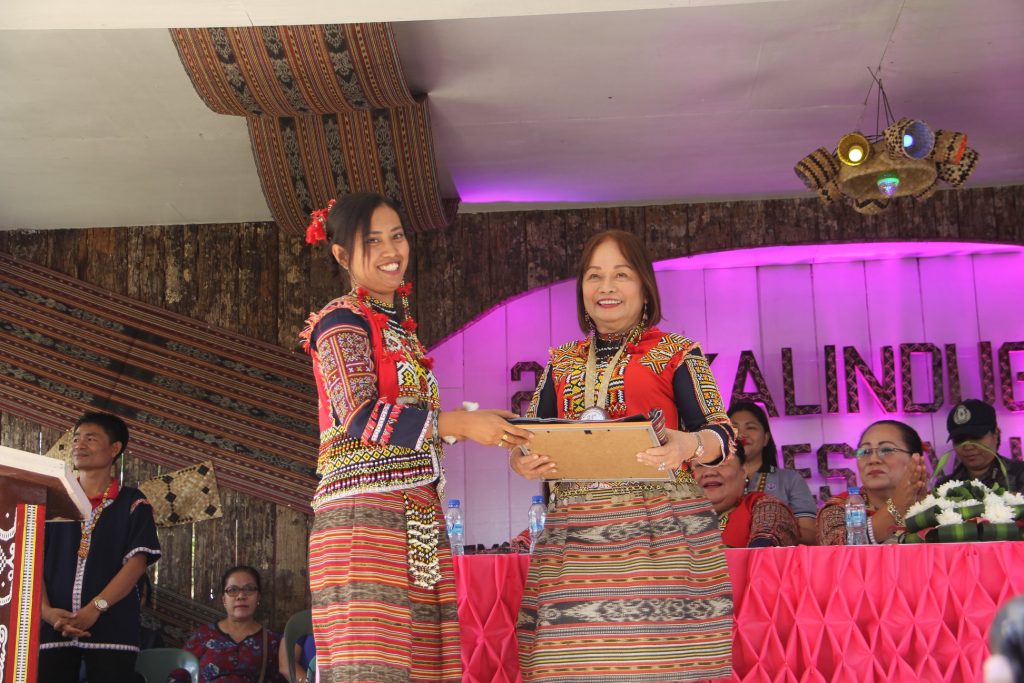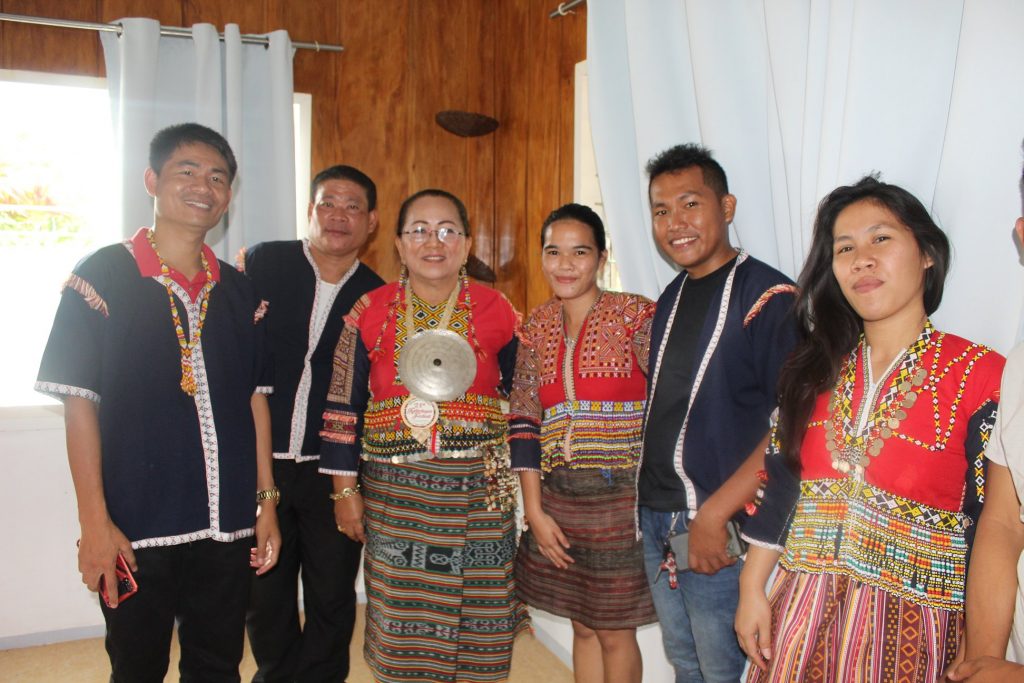CARAGA, DAVAO ORIENTAL — If one wants to see how the Mandaya tribe of Davao Oriental preserved their culture amidst the massive civilization in the mainstream society, then, visiting the Kalindugan festival is the answer.
Kalindugan is not just a feast to display the unity, strength and prestige of the Mandaya, but, it is a portrait of love and strength among Mandaya’s of Davao Oriental.
Last October 27, the Mandaya in the village of Sangab, in Barangay Pichon celebrated their 20th Kalindugan Festival. It has been an attraction among tourist as it displays how the tribe preserved their culture inside the vast hectarage of land recognized and awarded to them by the government through the Certificate of Ancestral Domain Title-01 (CADT-01).
The village is more than 1,000 above sea level (ASL), the air is cool as green forest surrounds the hilly village, where customary laws and indigenous practices is very much alive.
`As you enter the preserved place, one can see a big billboard informing everyone that you are entering a CADT-01 area where every Mandaya trait is practiced, simply means you are entering a sacred land and you must abide by the culture and practices, a condition rarely observed in many areas of Mindanao.

Christine Banugan, the first woman tribal chieftain of the town said “Kalindugan is one way of preserving the Mandaya culture, but above that, it is our way of showing how strong we are as one community.”
Banugan, a graduate of Ateneo de Davao University said that despite the evolution and development of (the) society, her heart and her being remained a true-blooded Mandaya. “We acquire education outside our communities but our spiritual and cultural being remain. Our very own identity will stay, as I remain a Mandaya for always be,” Banugan proudly explained.
Pablo Banabal, the principal in the remote village of Butay explained, “Inside our classrooms, we make sure that we include the preservation of our culture and environment, we want every child to keep their identity as Mandaya.’
Every Monday, Banabal said that students are required to wear their mandaya traditional outfit and everyone in school follows. The school has also designed a module where students are taught how to weave their fabrics, Dagmay, a very delicate clothing material made of Abacca fiber.
National Commission on Indigenous Peoples (NCIP) Commissioner for Southern and Eastern Mindanao Atty. Leonor Oralde-Quintayo admired the community’s strength and resiliency despite the challenges they have faced, including the murder of the late tribal chief Copertino Banugan in 2016 allegedly by New People’s Army and the leadership crisis within the tribe that ensued.
Copertino Banugan  is the father of Christine, the tribal chieftain. Under her watch, the young Banugan vowed to continue her father’s legacy of developing and protecting their community.
The community preserved the dignity and pride of Mandaya as they strengthen their defense system to guard the village from the influence of people outside their villages. It can be noted that in Davao Region, this Mandaya tribe was the first to be awarded a CADT recognizing their autonomy over their territory as an ancestral domain.
The Kalindugan festival was born a year after the Indigenous Peoples Right Act (IPRA) Law was inacted.
People of Pichon has gone a long way in terms of protecting their ancestral domain, in promoting their culture, as well as exercising their leadership towards self-determination according to Banugan. She also boasted what the CADT-01 community has accomplished over the years as they have built a model community that still affirms traditional culture and self-governance as indigenous peoples.
Banugan said that despite the trials, her people remain determined to exercise their rights through the customary laws as she also entices the young Mandaya generation to continue to preserve their way of life which are slowly vanishing as mainstream culture and values have started to pave its way through integration and cross-marriages with the migrant stock.
GOVERNMENT SUPPORT
The national government, through its policies and programs continue to benefit Indigenous Peoples communities in the country, including the Mandaya tribe of the CADT-01.
Caraga Mayor Alicia Mori throws every support to the CADT-01 community, and personally attend to them as she frequented the place to personally monitor any development in the area. “I want to make sure that Pichon receives all the programs and services they deserve as a people. And, that development must not exclude them especially when I bow out in 2022,” Mori added.
Pichon is also a beneficiary of a housing project from the National Housing Authority for the development of an IP village which will benefit the Mandaya residents living in danger zones. The NHA has provided P20-Million for the IP village, while a consultation has been held last week for the realization of the project.
Mori has also asked the Office of the President for the opening and construction of a bridge that will connect Sitio Butay to Pichon. “As it is now, residents of Butay has to walk eight hours in a 90-degree slope to reach the center of Sangab. It breaks my heart seeing children carrying abacca (their products) just to help their parents fend for the family,” Mori said.

She admired the dedication of Banabal and the teachers of Butay for their untiring support to the students in the area passing the difficult Caraga river just to attend to their students.
Davao Oriental Governor Nelson Dayanghirang, however, said, “We cannot close our eyes to the needs of the Pichon residents as they need more support given the situation, and, I will make sure that whatever infrastructure development there is, it will surely benefit them as a people.”
Governor Nelson Dayanghirang revealed that approaches in leadership in governing the villages of Indigenous Peoples in the Ancestral Domains were explored, thus, the establishment of an IP desk under his guidance. The IP desk wass created so that the issues formerly raised only to the IP Mandatory Representative via NCIP or tribal chieftains, are now properly channeled by his office to concerned agencies. Thus,promptly addressing issues and resolving conflicts that affect the lives and relationships within the tribe.
While First District Representative Corazon N. Malanyaon has recently secured a funding allocation for the construction of a Mandaya-inspired tribal court, as an essential infrastructure which will enable members and elders to orderly bring crucial matters before the tribal council.
Aside from awarding them a title over their ancestral domain, the national government through its agencies, like the Office of the Presidential Adviser on Peace Process, Department of Agriculture, Department of Social Welfare and Development, and the like, have been pouring projects for the community’s sustainable development.
The NCIP, particularly, has been extending assistance in the development of their Ancestral Domain Sustainable Development and Protection Plan (ADSDPP) which serves as the blueprint for the ancestral domain’s development. This document serves as a reference for national funding agencies on what projects to implement, thus, maximizing government resources and ensuring sustainability.
Also, partners on peace and security such as the police and the Philippine Army not only help protect them against outside threats but also encourage the Mandaya people’s meaningful participation in development endeavors in their own community.
Also, as they have been considered, protected and legally recognized, the IP communities are consistently urged to collaborate with the local and national government in the implementation of sustainable programs that continuously affect them as a people.-With report from Karen Deloso
